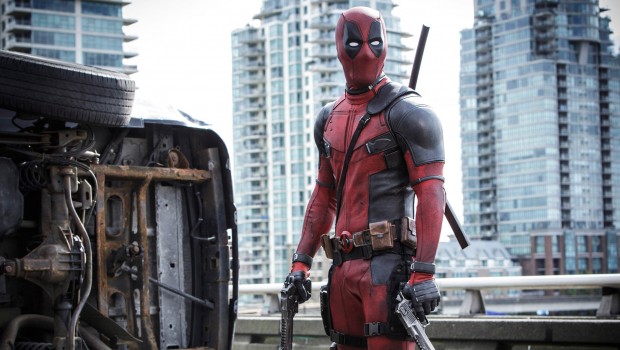Deadpool – Film Review
Reviewed by Damien Straker on the 21st of February 2016
Fox presents a film by Tim Miller
Produced by Simon Kinberg, Ryan Reynolds and Lauren Shuler Donner
Written by Rhett Reese, Paul Wernick, based on Deadpool Fabian Nicieza and Rob Liefeld
Starring Ryan Reynolds, Morena Baccarin, Ed Skrein, T. J. Miller, Gina Carano and Brianna Hildebrand
Music by Tom Holkenborg
Cinematography Ken Seng
Edited by Julian Clarke
Running Time: 108 minutes
Rating: MA15+
Release Date: the 11th of February 2016
Deadpool is proof that the superhero genre is in trouble. This is the film that is meant to parody all of its trappings and clichés but all the while doggedly following them. How is it that after the success and intelligence of the Nolan Batman films that these movies have slumped so quickly? Deadpool is adapted from the Marvel comic of the same name and one made in response to the self-seriousness of the Batman movies. But where Christopher Nolan’s films were made with great craftsmanship and care, Deadpool has as much attention to detail as a drunken frat party. It is puerile, witless and crass, a cynical cash-grab posturing as being post-modern or meta-fictional. The alleged humour is an excuse for Hollywood to treat the average audience member as though they are the lowest common denominator. Maybe mainstream films and video games are a mirror or product of their audiences though. We determine how we are treated as an audience by what we choose to pay for. But if you don’t want to be treated as a lumpen, do not to see Deadpool. Echoing its comic source, the film’s signature gimmick is breaking the fourth wall with the title character making self-referential nods, looking at the camera, cracking jokes and making pop references. Paired with endless swearing and sex jokes, the adolescent dialogue creates a mirage with some audience that this is a well thought-out and clever film. But for me, the humour is laugh-free, the goofball tone fluctuates wildly and the pacing is flattened at the hands of its first-time director Tim Miller. It’s curious as to why Ryan Reynolds, the film’s star and one of its producers, opted for a novice director. Furthermore, why he’s pursued such a juvenile project since the early 2000s is a mystery when he’s proven he can be a substantial and mature actor in films like Buried (2008).
Other than attitude and wielding both swords and guns, no other characteristics are longstanding about Reynold’s character Deadpool. He starts as an ordinary man named Wade, an ex-soldier turned mercenary who is a vigilante for hire, solving cases such intimidating a guy who is stalking someone. This inner life is the first of several points that are poorly explained because the film is persistently distracted by its own dumb jokes. The thin story continues: after Wade meets a woman named Vanessa (Morena Baccarin) and falls in love, he learns he has cancer. A shadowy organisation offers him an experiment to cure him of the disease. He agrees but is imprisoned by Ajax (Ed Skrein as a generic baddie), who makes him immune to pain but also disfigures him with scars over his face and wants to sell him as a slave of some kind. The film has no regard for developing the villain’s character or clarifying his motivations, meaning he perpetuates Marvel’s string of bland villains. Aside from the overdose of attitude, the film also tries hiding its nonsensical approach by repeatedly cutting the narrative timeline back and forth between Wade and Deadpool’s fight on a bridge, which we tiredly see at least three times. Were it not for this fractured structure, one would cleanly see how shamelessly generic the film is in spite of its belief it’s spoofing the genre. Once the narrative is finally set in motion, it’s unveiled as a dull revenge story where Deadpool must rescue his girlfriend, who he hasn’t seen since he undertook the procedure; it never broadens into a bigger plot or more important spectrum. The film also loses track of its sense of mischief and parody in the scenes where tries exploring Wade’s angst in not facing up to his girlfriend and fearing people are looking at his scarred face. This is an example of the film’s tone and mood drifting into more serious territory, which is what it’s supposed to oppose and seems counterproductive to its aims of parody.

What is worst about the film isn’t the way it tries to bait the audience by being deliberately offensive and violent, but that it is either too stupid or careless to follow its own set of rules or logic. Deadpool is apparently invincible yet he can still feel pain such as when he breaks his wrist by punching Colossus (voiced by Stefan Kapicic), who along with fellow X-Men Negasonic (Brianna Hildebrand), helps Deadpool (he shares the same universe as the famous mutants). Work that out. Similarly, in the showdown he must take cover from generic soldiers armed with assault weapons, which also makes no sense if he’s largely invincible. The film is lazy too with its scene transitions, perhaps because so often have we seen an ordinary man adopt a costume in these stories. Even the first Spider-Man movie made training and learning skills humorous long before this film, which forgoes information on how Wade suddenly learns the acrobatics and swordplay he showcases in the film’s ridiculous, over the top but tensionless action scenes or even why his personality emerges as even more jokey and sarcastic as Deadpool after being tortured and distanced from his partner. Is it a personality and character or a single gage routine stretched out across a feature film? The film isn’t making a comment on the limits of the superhero genre but gleefully taking advantage of the excitable comic book fanbase who will rush to see the film because of the source material and the film’s aggressive marketing. It is also an enormous contributor to dumbing down a relatively new film genre straining for credibility and American culture in general. I’ve said the genre is in trouble but there will be better, more sophisticated comic book films to see this year than Deadpool. In spite of the danger signs, it’s a very low bar to hurdle over.
Summary: It is an enormous contributor to dumbing down a relatively new film genre straining for credibility and American culture in general.







